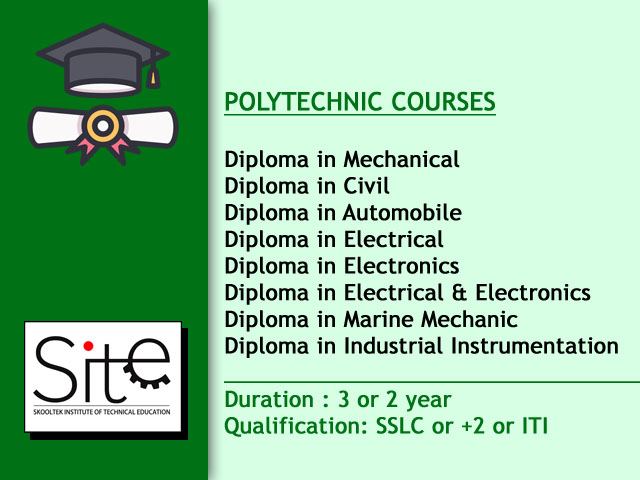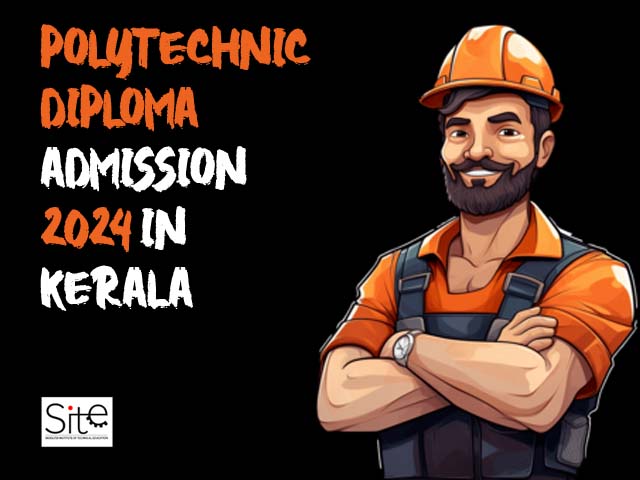- Have any questions?
- 9544233633
- info@skooltek.in
Career Opportunities after a Polytechnic Diploma

Career Opportunities of Polytechnic Diploma Course
April 16, 2024
Pursuing a polytechnic diploma course offers several advantages:
April 19, 2024Career Opportunities after a Polytechnic Diploma
- Diploma in Automobile Course
- Diploma in Civil Course
- Diploma in Electrical & Electronics Course
- Diploma in Electrical Course
- Diploma in Electronics Course
- Diploma in Industrial Instrumentation Course
- Diploma in Marine Mechanic Course
- Diploma in Mechanical Course
- Duration : 3 or 2 year
- poly diploma course admission open 2024 batch
- poly diploma lateral entry admission open 2024 batch
- Qualification: SSLC or +2 or ITI

Diploma Engineers
The beginning of the 21st century has been marked by rapid changes and challenges in a wide range of industries and technologies, and global competition is forcing changes in product design and production methods. In order to enhance competitive edge and to seize new opportunities, there is an increasing demand for professional engineers. Nurturing and developing manpower for this group of engineers takes time. It involves further studies at local or foreign universities. There is another group of school leavers who have the required attributes to become engineers. This group of students can be groomed as technical/associate engineers. The Polytechnic plays a crucial role in training this group of students. The world economic trend has shown that there will be a high demand for technically trained personnel. When the economy is good, there is a demand for more engineers to man the increased activity in the manufacturing and design sector.

When resources are poured into automation and developing industries, there will also be a demand for engineers. Although in times of recession, very often engineers are retrenched, the dips between the peaks are generally smoothed and it presents a better employment prospect as compared to other fields. With globalization, there is an increasing inflow of overseas companies to set up base here. The availability of cheap and good technical expertise has in recent years attracted many multinational corporations to set up research and design (R&D) facilities. This in turn provides more opportunities for engineers.For more details and poly diploma admission please click here https://www.skooltek.in/technical-diploma-courses/
Role in the Industry
The technological edge and constant innovation to gain differential advantage is what industry strives for, but due to global economic conditions, it needs to keep control on the cost involved in obtaining these advantages and it’s here that industry finds a resource that suits its needs and budget. With a strong foundation in applied science and engineering concepts, Polytechnic diploma engineers are most suited to industry requirements in technological development and implementation. Be it civil, mechanical, electrical, electronics, or computer engineering, a diploma engineer has adequate knowledge of the core concepts required in the field and with lesser cost as compared to the engineering graduates.

As our intention here is to address the industry needs and the role of diploma engineers in fulfilling those needs, a very precise examination of the role in the industry is essential. We must understand the fact that for running a country’s industry, the political and administrative decisions have very limited and indirect impact while the economic decisions drive the industry. Hence, the key driving force for any industry in a capitalistic economy is expansion and profits. To achieve this, industry seeks differential advantage over its competitor, easy availability of cost-effective resources, and a sharp technological edge.

There is currently a shortage of professional technical workers in a range of sectors. The skill shortage in India ensures that what you learn from completing a Polytechnic diploma is highly valuable to employers. Recent research has proven that 78% of Polytechnic Diploma holders are employed after training and were able to find work after their studies exceeded the number of jobs found by Bachelor degree graduates.You will potentially earn more from the beginning On average, people with a Certificate 10th or 12th qualification in India are earning 10000 more than Bachelor degrees graduate in their first year out of study.
An online survey report cites that the median full-time income for a Polytechnic Diploma holders is 120000 P/A. Whereas, the median graduate salary for students completing a bachelor’s degree is 100000 P/A. Often Polytechnic Diploma holders can earn higher salaries than many bachelor’s degree graduates.
For more details and poly diploma admission please click here https://www.skooltek.in/technical-diploma-courses/




